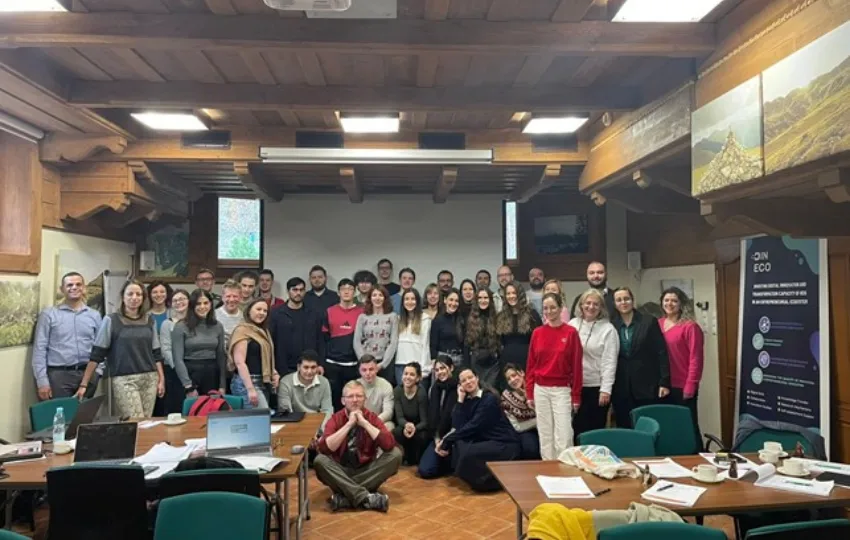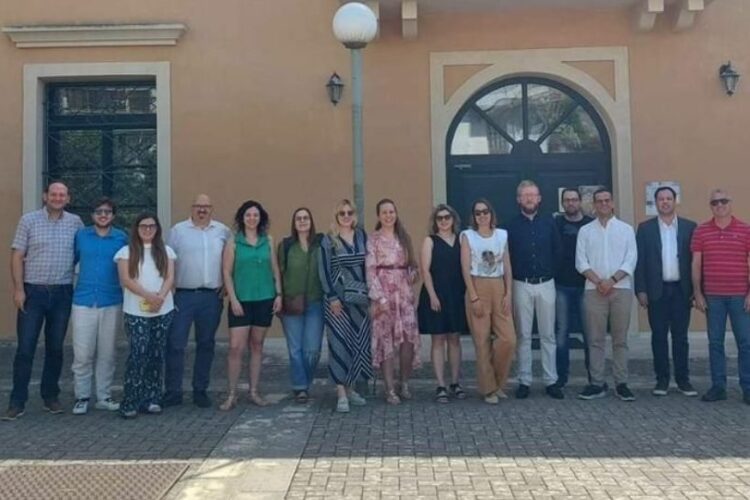

Date: 4-7 March 2024
Place: Kościelisko, Poland
Overview
The DIN ECO Spring School for Digital Innovation Business Projects was a comprehensive training program designed to equip participants with essential entrepreneurial skills. Hosted by the DIN-ECO project and supported by EIT Digital, the event attracted students, researchers, and academic staff from various Higher Education Institutions (HEIs). Participants engaged in a series of workshops and seminars, gaining practical experience and networking opportunities to foster innovation and project development.
Participants
- Experts/Trainers: 5
- Students/Researchers: 19
- Academic Staff: 14
- Non-Academic Staff: 7
Digital Innovation Projects
- Total Projects: 5
Key Outcomes
- Overcoming Public Speaking Fear: Strategies to manage fear and anxiety related to public speaking were taught, enhancing participants’ confidence in presenting their ideas.
- Tailoring Messages: Understanding audience analysis helped in crafting tailored messages, ensuring effective communication and engagement.
- Storytelling Techniques: Leveraging storytelling enhanced participants’ ability to convey messages persuasively and memorably.
- Effective Presentation Skills: Practical guidance on organizing presentations, using PowerPoint effectively, and employing impactful body language improved overall presentation quality.
- Business Model Canvas: Hands-on workshops provided valuable experience in using BMC tools for business segmentation, distribution channels, and refining business models.
- Intellectual Property Rights: Participants gained insights into protecting intellectual property, crucial for entrepreneurial ventures.
Comprehensive Approach
The Spring School’s holistic approach encompassed leadership, digital innovation, project profitability, and IP protection, fostering a supportive learning environment. This blend of theory and practical learning was augmented by expert-led seminars from Ionian University, Found.ation, Fondazione Fenice Onlus, and SGGW University. Key areas covered included:
- Leadership Skills: Developing entrepreneurial leadership capabilities.
- Digital Innovation: Introducing digital tools and concepts.
- Project Profitability: Techniques for ensuring financial viability.
- IP Protection: Understanding the intricacies of intellectual property rights.
Workshops and Mentorship
Workshops were a highlight, offering personalized guidance and tools for developing innovative projects. Led by mentors from Found.ation, Fondazione Fenice Onlus, and the Institute of Entrepreneurship Development, attendees honed their narrative techniques, perfected their pitches, and gained inspiration to turn ideas into reality.
Audience and Benefits
Students and Researchers
- Public Speaking: Techniques to overcome the fear of public speaking.
- Audience Analysis: Crafting effective messages based on audience analysis.
- Presentation Skills: Organizing presentations, storytelling, and using PowerPoint.
- Business Modeling: Hands-on experience with the Business Model Canvas.
Aspiring Entrepreneurs
- Pitching Skills: Mastering the art of business pitching.
- Business Model Development: Insights and tools for refining business models.
- Networking and Mentorship: Opportunities for networking and receiving guidance from experienced mentors.
General Participants
- Professional Development: Gaining valuable skills such as public speaking and audience engagement.
- Innovation and Creativity: Fostering creativity and innovation in business ideas.
Implementation and Methodology
The program was implemented through a structured schedule of seminars and workshops, led by experienced mentors from partnering organizations. Key activities included:
- Seminars: Covering leadership, digital innovation, project profitability, and IP protection.
- Workshops: Focusing on business modeling, presentation techniques, and using the Business Model Canvas.
- Interactive Sessions: Pitching sessions, feedback, and personalized supervision.
- Final Presentations: Teams showcased their projects, followed by an awarding session.
Success Factors and Replication
To replicate the success of the DIN ECO Spring School, consider the following:
- Clear Objectives: Define specific goals focusing on entrepreneurial skills and digital innovation.
- Expertise: Collaborate with experienced mentors and industry experts.
- Comprehensive Program: Cover essential topics like leadership, digital innovation, and IP protection.
- Interactive Learning: Use workshops, pitching sessions, and feedback for active participant engagement.
- Networking Opportunities: Facilitate networking with peers, mentors, and professionals.
- Supportive Environment: Provide guidance and feedback from academic and consulting staff.
- Practical Tools: Use frameworks like the Business Model Canvas.
- Cultural and Social Activities: Promote team bonding through integration dinners or campfires.
- Effective Communication: Teach public speaking, storytelling, and effective presentation techniques.
- IPR Awareness: Educate participants about intellectual property rights.
The DIN ECO Spring School for Digital Innovation Business Projects successfully provided a dynamic platform for practical learning and networking. Participants left equipped with the skills, knowledge, and inspiration necessary for entrepreneurial success in the digital age.
Want to know more or want to use our success story in your activities? Visit DIN ECO Resource Hub.
Funded by the European Union. Views and opinions expressed are however those of the author(s) only and do not necessarily reflect those of the European Union or the European Institute of Innovation and Technology (EIT). Neither the European Union nor the granting authority can be held responsible for them.






